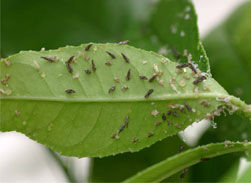A single female insect known to be a pest to citrus plants was found in Hollister, and now the hunt is on to find out if there are more.
A single Asian citrus psyllid, which can be a carrier of a disease that kills citrus trees and has so far been found in just one backyard tree in Southern California, was found in Hollister on April 11. A treatment program will be carried out on all citrus host plants within 100 meters of where the insect was trapped, according to a press release from the county agricultural commissioner’s office.
The discovery of the pest is of “grave concern” because the insect can carry the disease huanglongbing, which causes an infected tree to decline in health and produce bitter, misshaped fruit until it dies, according to the statement. There is no cure once a tree becomes infected.
All citrus plants and closely related species, such as curry trees, are susceptible hosts for both the insect and the disease. To date, the disease has only been detected in one backyard tree and one psyllid sample in the Hacienda Heights neighborhood of Los Angeles County.
Florida first detected the pest in 1998 and the actual disease in 2005, and now the two have been detected in all 30 citrus-producing counties in that state. The pest and disease are also present in Louisiana, Georgia, South Carolina and Texas. The states of Mississippi, Arizona and Alabama have detected the pest but not the disease.
The Asian citrus psyllid is a “serious pest” to citrus but even if the insects carry huanglongbing, the sick trees’ fruit will still be safe for human consumption, according to statement from the commissioner’s office.
Residents can help stop the spread of the insect, which can carry the tree-killing disease, by inspecting their trees for signs of the pest and allowing agricultural crews to access their property to look for and treat the insect. Residents in the area who think they may have seen the pest are urged to call the Pest Hotline at 1-800-491-1899. For more information about the pest or the disease it can carry, visit CaliforniaCitrusThreat.org or cdfa.ca.gov/plant/acp/.










